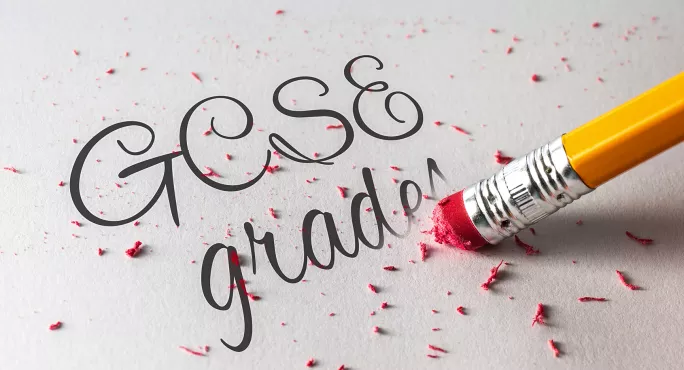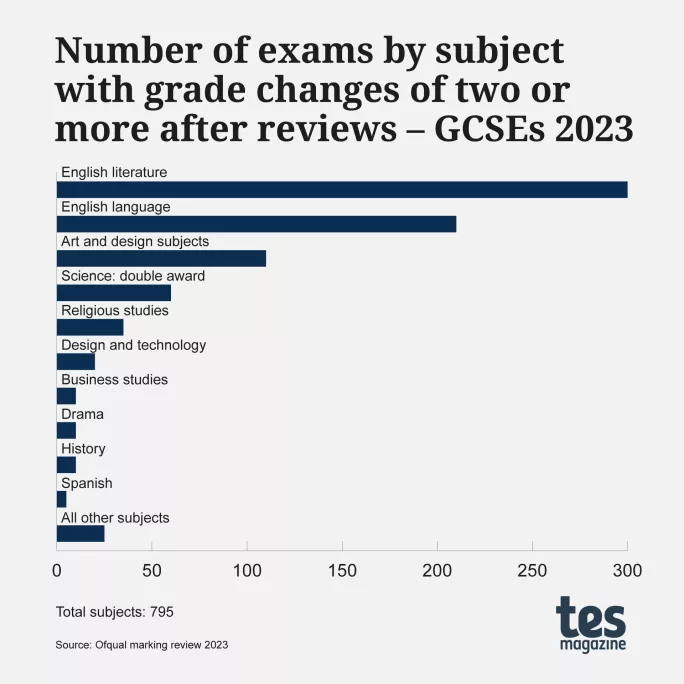Ofqual chiefs should consider reform of exam marking reviews

While much of the focus of the new year has been on the new Ofsted chief inspector Sir Martyn Oliver, it is worth noting that there is also a new team at Ofqual - chair Frances Wadsworth and chief regulator Sir Ian Bauckham.
While they will have many new projects to tackle - such as the rise in online assessments that examining bodies want to introduce - the issue of inconsistent and inaccurate marking that still affects our assessment system will hopefully be on their radar too.
Because, as Ofqual’s most recent report on Reviews of Marking and Moderation (RoMM) for the 2023 summer examination series noted, thousands of exams have their marks changed after review every year.
A total of 23,985 (3.4 per cent) of GCSE grades in the core subjects had to be changed after review: maths (6,605), English language (8,215), English literature (5,910) and double science (3,255).
That any grades in scientific/numerical subjects should need to be corrected is concerning. Even so, the current system serves Stem (science, technology, engineering and maths) subjects much better than subjective disciplines - as evidenced by the number of subjects moving more than two grades after review.
Ofqual data shows that 795 exam grades changed more than two grades. Of these, 210 were for English language, 300 for English literature and 110 for art and design subjects.
Conversely, double science had 60 changes of two grades and mathematics wasn’t even listed, suggesting no moves of two grades - a notable achievement, given that the subject had 761,960 entries.

On the one hand, it shows that the appeals process can work. However, the current system leaves a lot to be desired in terms of how appeals are made and, more significantly, how mistakes enter exam marking.
For example, now that centres aren’t marked by just one examiner, and individual scripts can be split into separate questions and parcelled out to even more markers, it’s almost impossible to locate the source(s) of inaccurate and inconsistent results.
This fragmentation makes RoMMs more time-consuming and expensive because centres can only query one by one.
In the past, whenever there were 10 to 13 grade changes within a centre, the entire cohort would be eligible for a whole centre review at the awarding body’s expense. With such tight budgets, few schools can justify the risk now.
Therefore shouldn’t the financial burden for reviews be borne by awarding bodies as with the SQA last summer?
To keep the number of reviews manageable and prevent routine strategic appeals around borderlines, Ofqual could impose penalty charges on schools misusing the system.
Customise the system for arts and humanities
What’s more, the fact so many more arts and humanities grades are changed shows that the system remains unable to provide accurate marking - a point Ofqual has acknowledged in the past, with research showing the probability of getting a definitive grade is only 0.6 for English compared with 0.96 for maths.
Given this, we need a more stringent framework for arts and humanities. For instance, these exams should be scheduled earliest to give awarding bodies time to run extra checks before results day.
In the past, the marking review, which took place before grade award, allowed senior examiners to look at scripts close to the expected grade thresholds and review scripts around that mark.
They could correct any marking errors immediately and review further scripts. Sometimes scaling recommendations could be used as a shortcut if scripts were consistently under- or over-rewarded.
Currently, though, the only checks are through using “seeds” - scripts that have already been marked, which are placed at random intervals within the live marking to check the judgement of an individual marker.
An examiner who is too far out of line is stopped and made to reflect on the standard by the team leader before being allowed to continue.
This process overstretches team leaders, particularly in English. If teams were smaller, senior examiners could offer closer individual support to those examiners failing the seeds, where the corrective dialogue may need to be lengthy and complex to ensure the examiner is competent and confident to continue.
Research is needed to evaluate corrective action around the seeds. For example, how far back are examiners expected to check their marking pre-stoppage? How much do team leaders check the standard post-stoppage? And how effective is their input in filtering out mistakes?
Perhaps in its annual report, Ofqual could include details of how awarding bodies re-check work of aberrant examiners after RoMMs and any consequent upgrades.
A more assertive role for Ofqual
Currently schools shoulder too much of the burden for rectifying inaccurate grades.
Instead of a functioning appeals system that is open to all, we have some centres acting as a final patchy layer of quality control and others simply not doing anything, chiefly owing to the cost of appealing, potentially leaving pupils with unfair grades.
Radical reform is needed to restore stakeholders’ trust and return responsibility to the regulator and awarding bodies - something those leading Ofqual should seek to address as a matter of priority.
Yvonne Williams, has taught for more than 30 years, and was a member of the Department for Education Marking Policy Review Group, which looked at teacher workload in 2015-16
You need a Tes subscription to read this article
Subscribe now to read this article and get other subscriber-only content:
- Unlimited access to all Tes magazine content
- Exclusive subscriber-only stories
- Award-winning email newsletters
Already a subscriber? Log in
You need a subscription to read this article
Subscribe now to read this article and get other subscriber-only content, including:
- Unlimited access to all Tes magazine content
- Exclusive subscriber-only stories
- Award-winning email newsletters
topics in this article



